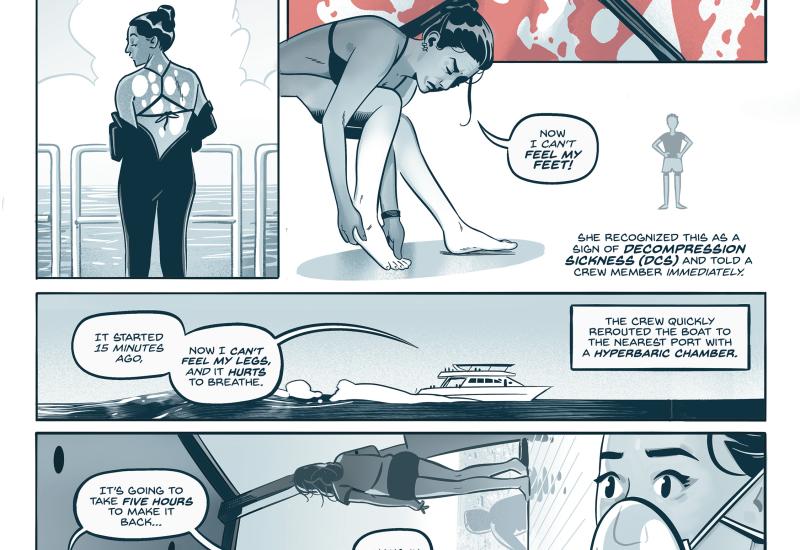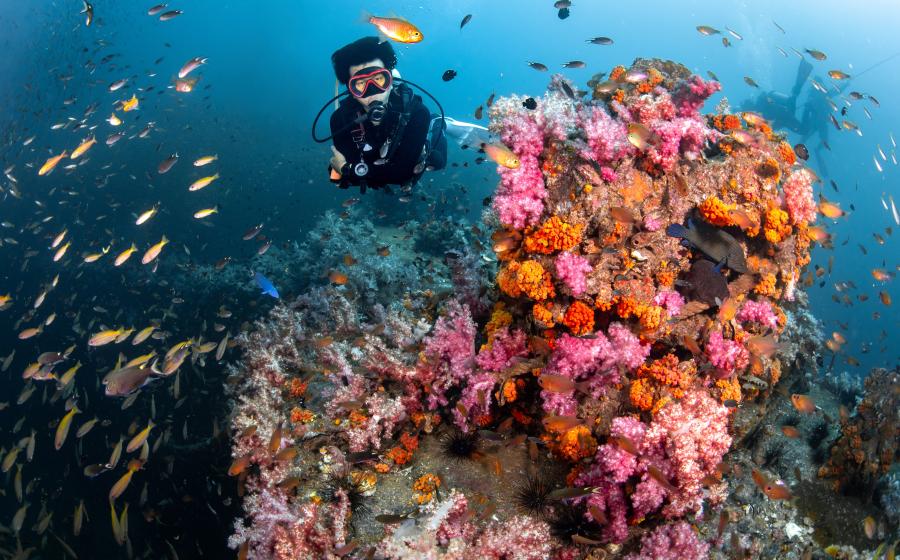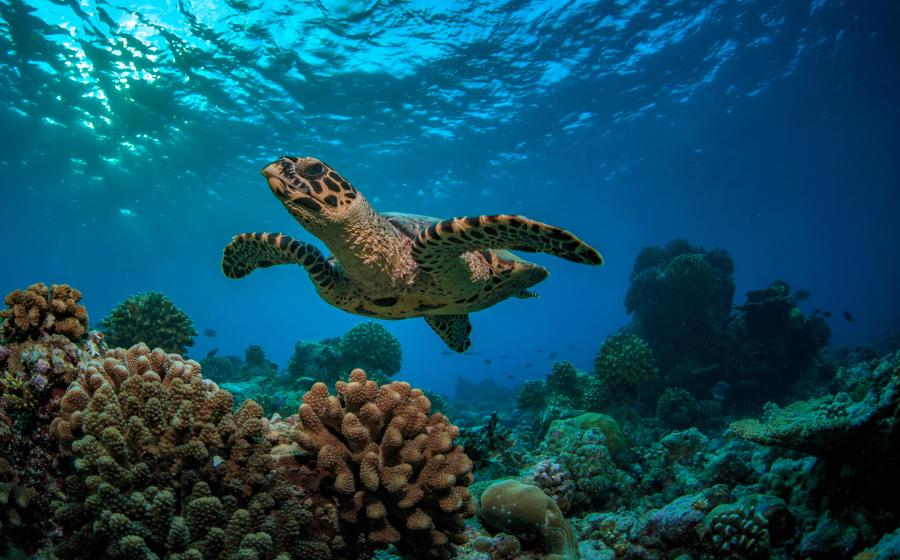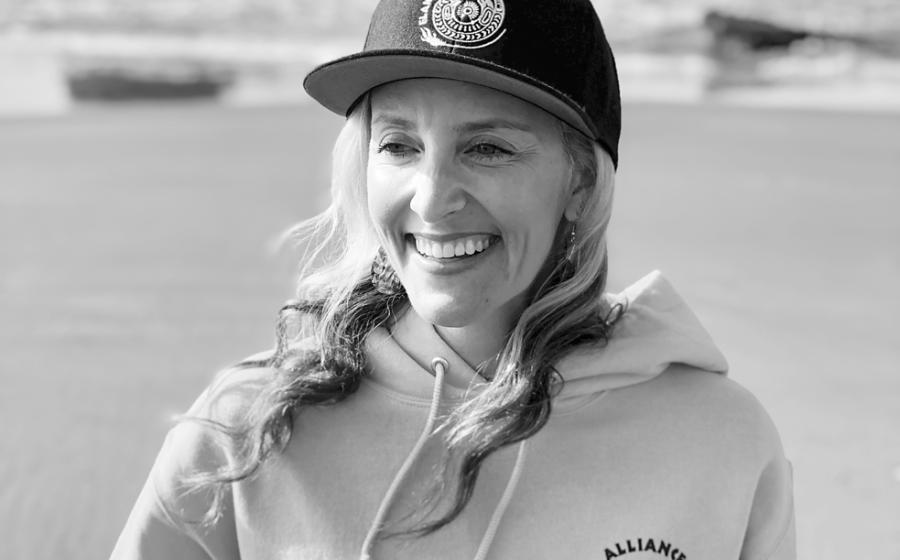One Diver Too Many

It was a great day out on the lake. Scott went for a short dive off his boat and then returned to the surface and explained to Joey how the equipment worked. Joey was nervous as he took Scott’s dive gear from him and put it on, but he was sort of excited too. He loved the feeling of breathing underwater for the first time. He hesitated for a second when he first put his face in the water, but then he relaxed and slowly moved away from the boat. All the gear had him feeling awkward and ungainly, but he knew he could get used to it. As he began his decent, he was beginning to enjoy himself and was already imagining himself going diving with Scott around the world. And then he kicked his feet and nothing happened. He looked down and saw one of his fins falling away. He began clawing his way to the surface.
The Divers
Joey and Scott had been friends since childhood and loved hanging out together. Jobs and work had taken them in different directions, but they got together in the summer whenever they could. Scott had learned to dive on vacation and loved it. He bought a full set of gear that he kept on his personal boat on the lake. Scott was a swimmer and very confident, while Joey was always a little nervous about the water. Still, he had allowed Scott to talk him into going diving, just to get a feel for breathing underwater. Scott was hoping his best friend would get certified and then they could dive together too. That way, they would always have each other as dive buddies.
The Dives
Scott donned his dive equipment and explained each piece to his friend as he put it on. He told him how the regulator worked and how to clear his ears. From there he jumped into the water and swam around near the surface so Joey could watch him. Joey hadn’t taken a training course. He wasn’t a strong swimmer or very comfortable in the water. But he trusted his friend, and after watching Scott from the boat he felt he could do it. Joey and Scott were about the same size and the water was warm, so Joey simply strapped on Scott’s BC with its integrated weights, took his mask and fins and swam away from the boat. At first he stayed close, but then he slowly began swimming along the rock wall where they were anchored. Scott had taught Joey how to clear his ears and Joey was getting comfortable with this new feeling as he dropped down to about 20 feet.
The Accident
Joey was doing fine, moving through the water slowly. Since he had never learned how to swim properly with fins, he was using his hands as much as he used his legs to move around. He was breathing hard from the exertion, but he didn’t realize that he wasn’t supposed to feel that way. He noticed he wasn’t moving as smoothly as his friend had, but he knew that would come with time and practice. When the fin strap slipped off Joey’s foot and the fin floated away, he didn’t notice it at first. After a moment, he realized he wasn’t moving through the water and then looked down to realize his fin was gone. He panicked, not knowing what to do. He could think only that he needed to get back to the boat — Scott could help. He clawed his way toward the surface and immediately dropped the regulator from his mouth and screamed to Scott for help. He was about 20 yards away from the boat and it took Scott a moment to realize what was happening. Joey had no idea how to make himself positively buoyant, and he sank back underwater. This time, though, he didn’t have the regulator in his mouth. Panic set in as he suddenly couldn’t breathe or swim. Scott didn’t have any gear, not even a mask or fins. He jumped into the water, but by the time he reached the spot where his friend had surfaced, Joey was gone and Scott didn’t have any way to find him. He swam around for a few minutes looking, but then remembered that the lake dropped off more than 100 feet where they were anchored. When Scott got back into the boat, he had no way to call for help, so he had to flag down another boater and wait for that boater to reach shore to call for help. It took nearly an hour for help to arrive.
Analysis
This type of accident is rare, but it does happen. A diver persuades a friend to try diving, but the untrained diver has no idea how to handle a problem underwater. In this case, Joey could have made himself positively buoyant using his BC and ditched his weights so he could relax on the surface. If he had been trained, he wouldn’t have dropped his regulator when he hit the surface, or he at least would have known how to find it when he slid back underwater. At any point, basic scuba diving training would have taken over and kept Joey from drowning. If they’d had two sets of dive gear, Scott would have been beside Joey all along and could have helped him out, calming him and helping him to the surface. He also would have been able to find Joey after he descended back below the surface. In short, Joey had no business being in the water. He was untrained and had no buddy to dive with, and there was no emergency backup should trouble arise, as it did. Scott wasn’t trained as a dive instructor and never should have taken his friend diving. Worse, he didn’t actually take his friend diving; rather, he gave him the tools to go diving by himself. The last mistake Scott made was not having an emergency plan and a way to call for help. Divers make dives every day from private boats on lakes and in the ocean. Having a marine radio to call for help, and knowing how to use it, should be part of every emergency plan. Divers who aren’t prepared for an emergency lose valuable time that could be spent searching for a missing diver.
Lessons for Life
- Seek professional training before attempting to learn to dive.
- Do not take untrained divers diving with your gear unless you both have gear and unless you are trained as an instructor.
- Do not make solo dives without proper training and experience.
- Have an emergency assistance plan in case a diver from your private boat gets in trouble.
Eric Douglas co-authored the book Scuba Diving Safety and has written a series of dive adventure novels and short stories. Check out his website at www.booksbyeric.com.
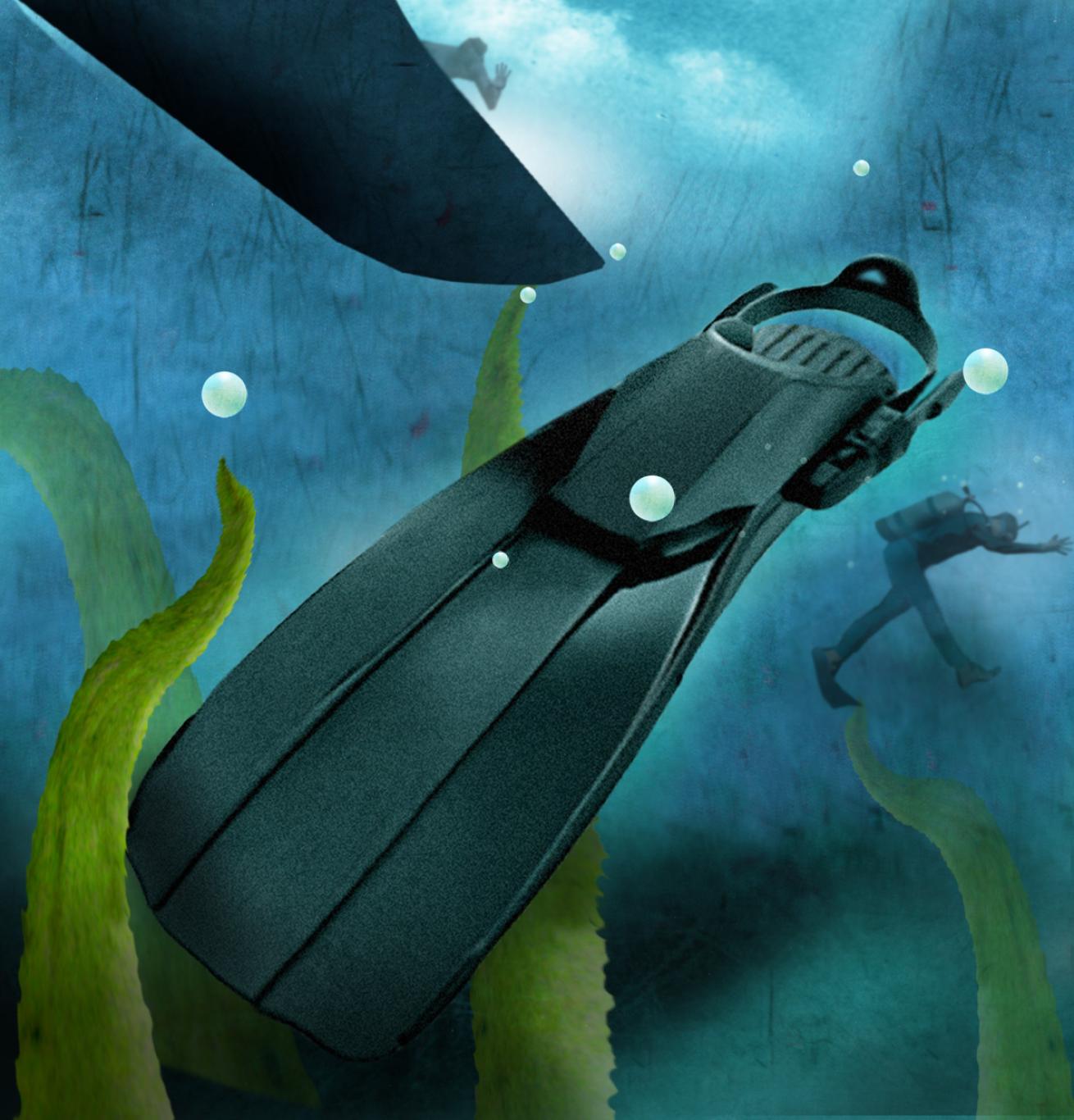
It was a great day out on the lake. Scott went for a short dive off his boat and then returned to the surface and explained to Joey how the equipment worked. Joey was nervous as he took Scott’s dive gear from him and put it on, but he was sort of excited too. He loved the feeling of breathing underwater for the first time. He hesitated for a second when he first put his face in the water, but then he relaxed and slowly moved away from the boat. All the gear had him feeling awkward and ungainly, but he knew he could get used to it. As he began his decent, he was beginning to enjoy himself and was already imagining himself going diving with Scott around the world. And then he kicked his feet and nothing happened. He looked down and saw one of his fins falling away. He began clawing his way to the surface.
The Divers
Joey and Scott had been friends since childhood and loved hanging out together. Jobs and work had taken them in different directions, but they got together in the summer whenever they could. Scott had learned to dive on vacation and loved it. He bought a full set of gear that he kept on his personal boat on the lake. Scott was a swimmer and very confident, while Joey was always a little nervous about the water. Still, he had allowed Scott to talk him into going diving, just to get a feel for breathing underwater. Scott was hoping his best friend would get certified and then they could dive together too. That way, they would always have each other as dive buddies.
The Dives
Scott donned his dive equipment and explained each piece to his friend as he put it on. He told him how the regulator worked and how to clear his ears. From there he jumped into the water and swam around near the surface so Joey could watch him. Joey hadn’t taken a training course. He wasn’t a strong swimmer or very comfortable in the water. But he trusted his friend, and after watching Scott from the boat he felt he could do it. Joey and Scott were about the same size and the water was warm, so Joey simply strapped on Scott’s BC with its integrated weights, took his mask and fins and swam away from the boat. At first he stayed close, but then he slowly began swimming along the rock wall where they were anchored. Scott had taught Joey how to clear his ears and Joey was getting comfortable with this new feeling as he dropped down to about 20 feet.
The Accident
Joey was doing fine, moving through the water slowly. Since he had never learned how to swim properly with fins, he was using his hands as much as he used his legs to move around. He was breathing hard from the exertion, but he didn’t realize that he wasn’t supposed to feel that way. He noticed he wasn’t moving as smoothly as his friend had, but he knew that would come with time and practice. When the fin strap slipped off Joey’s foot and the fin floated away, he didn’t notice it at first. After a moment, he realized he wasn’t moving through the water and then looked down to realize his fin was gone. He panicked, not knowing what to do. He could think only that he needed to get back to the boat — Scott could help. He clawed his way toward the surface and immediately dropped the regulator from his mouth and screamed to Scott for help. He was about 20 yards away from the boat and it took Scott a moment to realize what was happening. Joey had no idea how to make himself positively buoyant, and he sank back underwater. This time, though, he didn’t have the regulator in his mouth. Panic set in as he suddenly couldn’t breathe or swim. Scott didn’t have any gear, not even a mask or fins. He jumped into the water, but by the time he reached the spot where his friend had surfaced, Joey was gone and Scott didn’t have any way to find him. He swam around for a few minutes looking, but then remembered that the lake dropped off more than 100 feet where they were anchored. When Scott got back into the boat, he had no way to call for help, so he had to flag down another boater and wait for that boater to reach shore to call for help. It took nearly an hour for help to arrive.
Analysis
This type of accident is rare, but it does happen. A diver persuades a friend to try diving, but the untrained diver has no idea how to handle a problem underwater. In this case, Joey could have made himself positively buoyant using his BC and ditched his weights so he could relax on the surface. If he had been trained, he wouldn’t have dropped his regulator when he hit the surface, or he at least would have known how to find it when he slid back underwater. At any point, basic scuba diving training would have taken over and kept Joey from drowning. If they’d had two sets of dive gear, Scott would have been beside Joey all along and could have helped him out, calming him and helping him to the surface. He also would have been able to find Joey after he descended back below the surface. In short, Joey had no business being in the water. He was untrained and had no buddy to dive with, and there was no emergency backup should trouble arise, as it did. Scott wasn’t trained as a dive instructor and never should have taken his friend diving. Worse, he didn’t actually take his friend diving; rather, he gave him the tools to go diving by himself. The last mistake Scott made was not having an emergency plan and a way to call for help. Divers make dives every day from private boats on lakes and in the ocean. Having a marine radio to call for help, and knowing how to use it, should be part of every emergency plan. Divers who aren’t prepared for an emergency lose valuable time that could be spent searching for a missing diver.
Lessons for Life
- Seek professional training before attempting to learn to dive.
- Do not take untrained divers diving with your gear unless you both have gear and unless you are trained as an instructor.
- Do not make solo dives without proper training and experience.
- Have an emergency assistance plan in case a diver from your private boat gets in trouble.
Eric Douglas co-authored the book Scuba Diving Safety and has written a series of dive adventure novels and short stories. Check out his website at www.booksbyeric.com.

